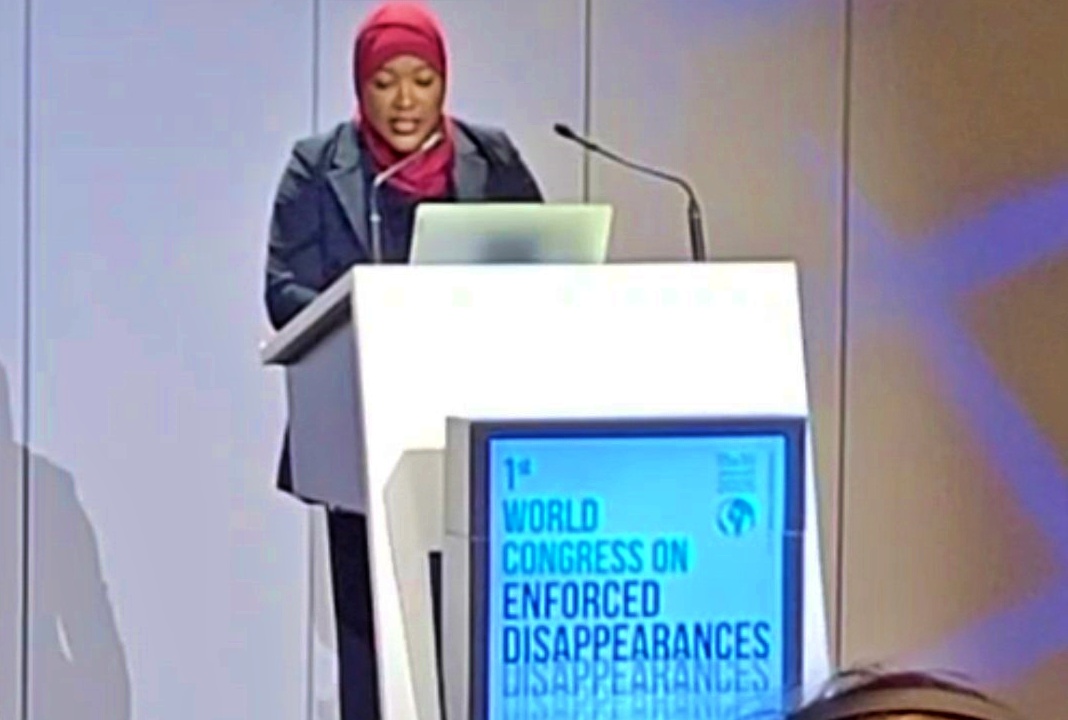Gambiaj.com – (Geneva, Switzerland) – At the 1st World Congress Against Enforced Disappearance, held from January 15–16, 2025, in Geneva, the Republic of The Gambia announced ambitious plans to adopt legislation criminalizing enforced disappearances by March 2026. This move aims to bolster justice and accountability in the country’s human rights framework.
Speaking at the congress, Bafou Jeng, the Human Rights Councillor at The Gambia’s Permanent Mission to the United Nations and other international organizations in Geneva, reaffirmed the country’s commitment to combating enforced disappearances.
“The Gambia reaffirms its unwavering commitment to the fight against enforced disappearances and the promotion of accountability and justice for all,” Ms. Jeng stated.
Ms. Jeng outlined The Gambia’s progress since signing and ratifying the International Convention for the Protection of All Persons from Enforced Disappearance (CED) in 2018. A key achievement was the submission of its initial report to the Committee on Enforced Disappearances in 2022, which Ms. Jeng hailed as a “milestone in transparency and compliance.”
Ahead of its first review by the committee in March 2025, The Gambia has made several significant pledges to enhance its legal and support systems.
Adoption of Comprehensive Legislation
The Gambia pledged to enact legislation by March 2026 that defines enforced disappearance as a distinct criminal offense. The proposed law will include mechanisms for victim support, accountability, and prevention.
“We are committed to adopting legislation aimed at strengthening the existing legal framework in the country, ensuring it is aligned with international standards,” Ms. Jeng noted.
The Gambian government also committed to formulating a National Action Plan by March 2026. This plan, to be developed in collaboration with victims, civil society organizations, and national human rights institutions, will focus on inclusivity and effectiveness.
Support for Victims
To empower victims and their families, The Gambia aims to establish programs offering legal, psychological, and socio-economic support by December 2025. These initiatives will ensure access to justice and comprehensive remedies.
“While this commitment is presently ongoing, we pledge to ensure victims and their families receive the support they deserve to heal and seek justice,” Ms. Jeng emphasized.
The Gambia is expanding its educational campaigns and specialized training programs for law enforcement, the judiciary, and other stakeholders to raise awareness and enhance accountability.
“The Republic of The Gambia stands resolute in its commitment to addressing enforced disappearances, both at home and globally,” Ms. Jeng affirmed.
Victims of enforced disappearances seek justice and closure.
Ayesha Harun Jammeh, co-founder of the Victims Center and niece of former president Yahya Jammeh, shared the personal trauma her family endured during Jammeh’s regime following the illegal arrest, by Jammeh’s henchmen, and the enforced disappearance of her father, Haruna Jammeh.
“The trauma is compounded by uncertainty about what happened to their parents, about their futures, and about their place in societies that often fail to recognize their unique struggles,” Ms. Harun stated.
She underscored the exclusion many victims face in transitional justice mechanisms, highlighting the need for tailored support to address the profound impact of enforced disappearances.
Co-organized by the United Nations and the Convention Against Enforced Disappearances Initiative (CEDI), the congress focused on raising awareness, promoting universal ratification, and ensuring implementation of the CED.
With over 300 participants from 120 countries, the event included representatives from Gambian civil society organizations, the National Human Rights Commission, and state officials.










